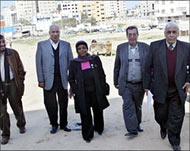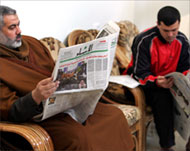Haniya seeks secular groups’ support
A Hamas official to be charged with forming a new Palestinian government is seeking to build a coalition with secular groups, including Fatah.

Ismail Haniya, 43, a former university administrator and student organiser for the Islamic resistance group, was nominated for the post by fellow-members after Hamas won a landslide victory in Palestinian parliamentary elections last month.
On Monday in Gaza he met Mahmoud Abbas, the Palestinian Authority president, and a spokesman said Abbas would hand him a written request to form a government in a second round of talks on Tuesday.
Abbas’ Fatah, which had dominated Palestinian life for four decades won only 45 seats.
Haniya has five weeks to form a government. Hamas officials held coalition talks with the leftist, secular Popular Front for the Liberation of Palestine on Monday, and Haniya said he would speak to members of Abbas’ ousted Fatah later in the week.
The process of picking him as prime minister-designate is a mere formality after the election, when Hamas won 74 seats in the 132-member legislature.
Further talks
Palestinian officials did not explain the delay, but Abbas has been pressing Hamas to moderate its anti-Israel positions and accept the idea of peace talks. Hamas has refused.
Nabil Abu Rudaina, an Abbas aide, said on Monday further Abbas-Haniya talks were set for Tuesday.
Under the Palestinian constitution the prime minister appoints the cabinet – with a maximum of 24 ministers – drafts policy, oversees the work of ministries and directs some of the security forces.
 |
|
Hamas is hoping to set up a |
The rest of the security forces, along with foreign relations and any peace negotiations with Israel, however, remain the province of Abbas as Palestinian Authority president.
After the Monday meeting, Haniya said he would try to form a joint government “that can shoulder its responsibilities in the political area and internal issues”.
So far, Fatah has refused to join.
Hamas is trying to convince other Palestinian factions to join a coalition, hoping to persuade the world that its broad-based cabinet represents all the Palestinians and should not be the target of a boycott.
Even before he takes office, Haniya has been shunned by Israel, the US and the Europe Union.
Israel froze the transfer of funds to the Palestinian Authority, and Western nations threatened to halt hundreds of millions of dollars of foreign aid when Haniya takes office.
Legal means
The decision to freeze transfer of tax money collected for the Palestinians drew criticism from Haniya.
“The Israelis are trying to starve innocent people by taking money from our taxes, and we are going to fight this by all legal means,” he said.
Raanan Gissin, an Israeli official, rebuffed charges that Israel was breaking the interim peace accord that mandates handing over the funds.
|
“A Hamas state on the borders of Israel is a real threat. This will be a radical Sunni state that radical forces can reach from around the world” Yuval Diskin, |
He said Israel was not obliged to transfer funds that could be used for terrorism, and Israel was not obliged to follow the agreement because “Hamas does not respect it.”
Yuval Diskin, head of the Shin Bet security agency, said a Hamas entity next to Israel was a “strategic threat”.
He told a parliamentary committee that Hamas could invite hardline groups like al-Qaida and Hizb Allah to operate in Palestinian areas.
“A Hamas state on the borders of Israel is a real threat. This will be a radical Sunni state that radical forces can reach from around the world.”
Modest lifestyle
Haniya is married with 11 children and still lives in the refugee camp, in a modest house on a narrow street overflowing with sewage.
In June 2003 he escaped an Israeli assassination attempt. He rose to prominence after Israel’s assassinations in 2004 of Ahmad Yassin and his successor as Hamas leader, Abd al-Aziz al-Rantisi.
 |
|
Haniya lives in a modest house in |
A man with an imposing presence, Haniya is known as an able negotiator. He served as a liaison between Hamas and the Palestinian Authority, established in 1994 and dominated by Abbas’ Fatah movement until its electoral defeat last month.
He is said to enjoy good relations with Abbas.
Hamas has killed hundreds of Israelis in suicide bombings and remains committed to Israel’s destruction, but Palestinian political analyst Talal Ukal says Haniya believes that political goals can also be achieved by nonviolent means.
“He is not a believer in violence all the way,” Ukal told The Associated Press. “He understands that there are other means of struggle that can be followed.”
Armistice?
Hamas has observed a yearlong truce with Israel and says it will consider a long-term armistice if Israel follows last year’s Gaza pullout with a withdrawal from the West Bank.
Nevertheless, after the party won 74 of 132 seats in the parliament – the Palestinian Legislative Council – Haniya dismissed Western calls for Hamas to disarm and renounce violence.
“The Europeans and Americans want to tell Hamas that you can keep one of two: weapons or the legislative council,” he said. “We say weapons and the legislative council, and there is no contradiction.”